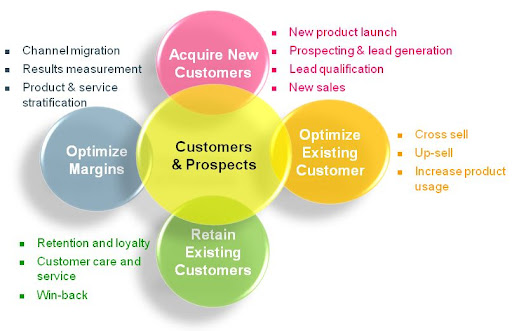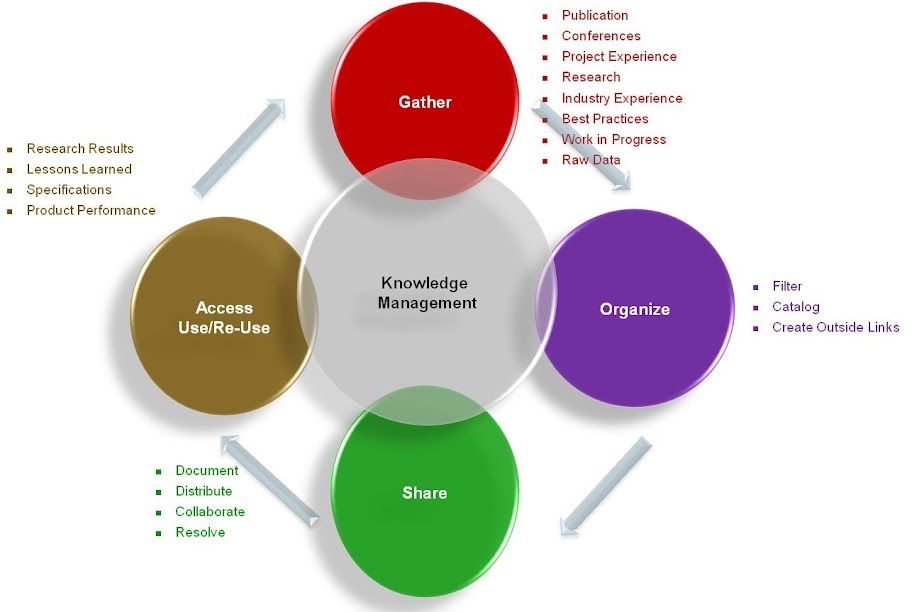With the advancement of technology and growing customer demands, the differences between KM and CRM are blurring. In this post, I shall try to discuss a case for the importance of KM in CRM for organizational success.
The Case for Knowledge Management in CRM
There was a time, when CRM, KM, E-Business (Service, Sales and Marketing) all had different roles to perform and different objectives to meet.
Customer Relationship Management (CRM)
CRM was designed to be a customer-centric model that would support the three phases of a seller/buyer relationship: new customer acquisition, retention of existing customers and lifetime value maximisation - essentially: Marketing, Sales & Service.

Click to Enlarge
However, For CRM to be successful it has to become an ethos, the very culture itself; strategy and appropriate technology alone are not enough. A truly customer focused company concentrates all efforts on satisfying profitable customers, acquiring and retaining these customers and growing long-term revenues from them.

Click to Enlarge
Knowledge Management (KM)
By definition, Knowledge Management is a cycle of gathering knowledge, organizing it, sharing it, and accessing it.

Click to Enlarge
Historically, KM has been associated with exploiting the internal assets of an organization - the people and processes.

Cick to Enlarge
It is, however, the knowledge and understanding of all stakeholders (customers, suppliers, employees, partners, etc) that is really the key to differentiation and competitiveness.

Click to Enlarge
The Case for KM in CRM
Gearing towards next-generation Enterprise applications, the terms KM, CRM and e-business have become more-or-less interchangeable. Besides, with B2B and B2C interactions realizing greater sophistication levels, the boundaries between KM and CRM will become more blurred. Or, so to say, the case for Knowledge Management in CRM shall become stronger and more and more inevitable. Some of the reasons for KM in CRM are cited below :
- Customers are now demanding & expecting bigger bargains, better products & faster service on a personalized scale. - CRM approaches alone cannot take care of providing such high-level of personalization.
- Combining customer knowledge with CRM enables organizations to target customers with high life time / strategic value; thus leading to future growth opportunities.
- Customer intimacy and knowledge of industry-specific processes tailored to meet business needs are essential ingredients of organizational success.
- Organizations must formulate a dynamic corporate buying and selling model such that customers receive optimum results based on the combination of suppliers, services & processes, most appropriate to their own business model & vertical industry.
- To achieve this dynamism, organizations must have fast and easy access to information about its own business operations, its customers & their vertical processes & business models - the forte of Knowledge Management
- Managing this extended enterprise-knowledge in a customized manner by applying knowledge relevant to particular verticals, shall be the differentiating factor for on-line intermediaries - the opportunity for E-business providers.
KM supplies the knowledge that defines how a business operates, and CRM defines the nature of each customer interaction. Thus we realize that CRM or KM alone cannot handle the growing demands of a customer-centric industry - a balanced blend of both disciplines shall enable organizations to mold all aspects of their business for effectiveness of each customer relationship.
References:
- The formula for a successful business - Susan Colling
- Know thy customer, know thyself - Peter Dorrington
- CRM is not a plug-in - Gideon Davenport
